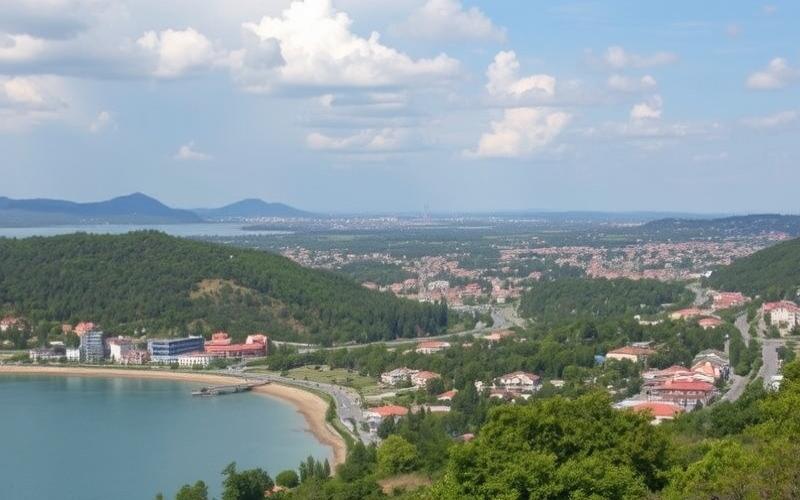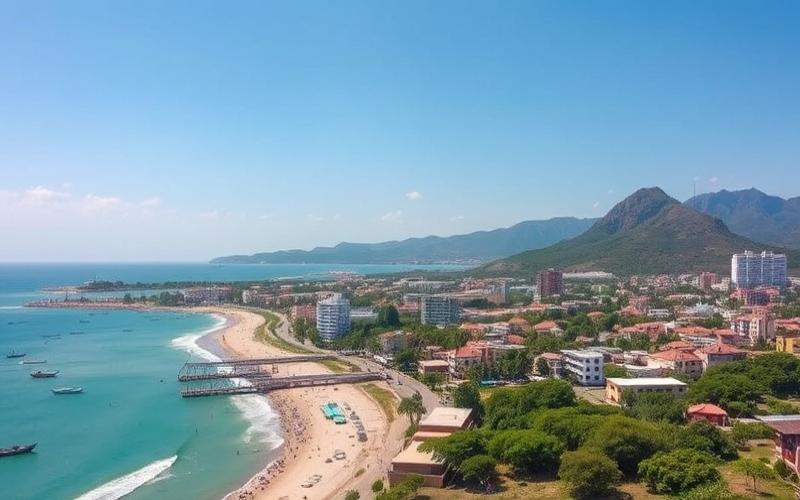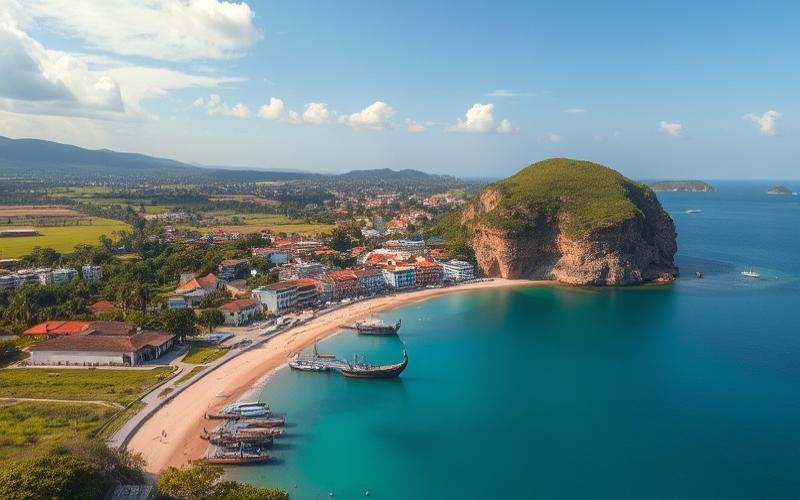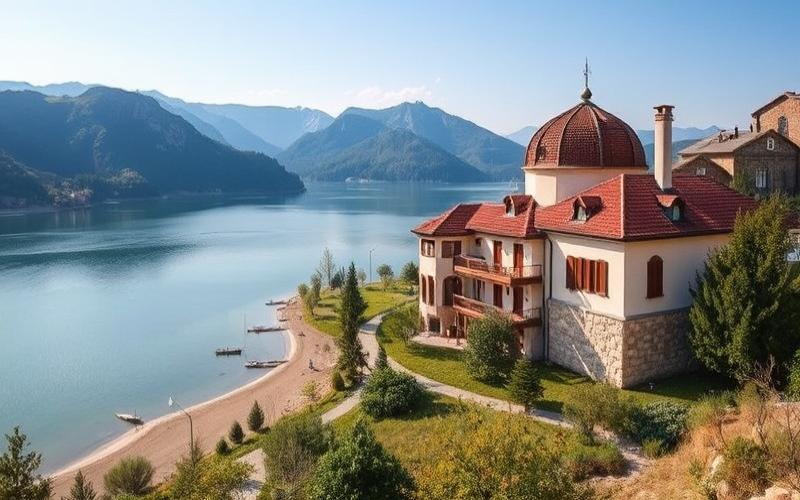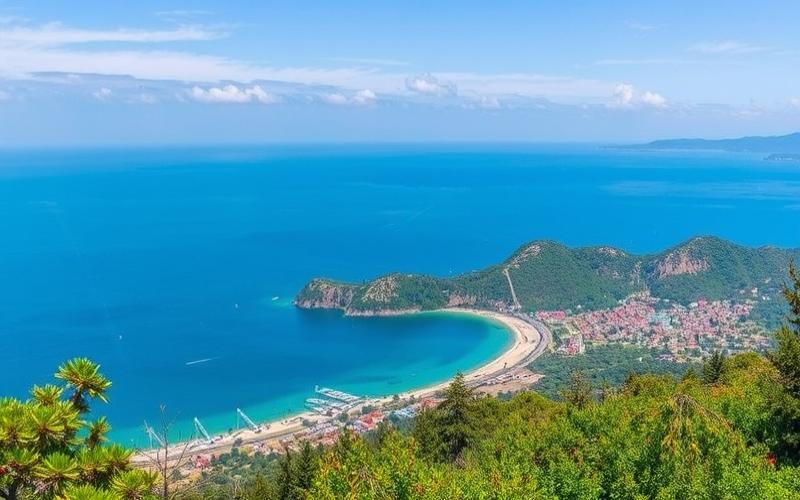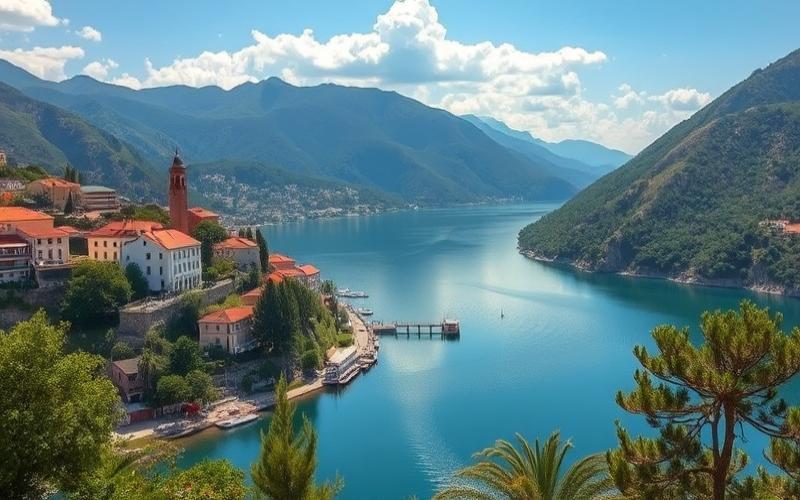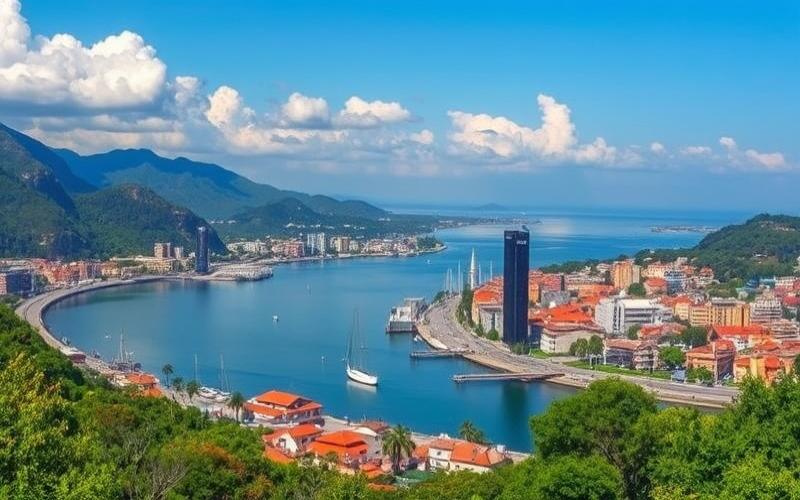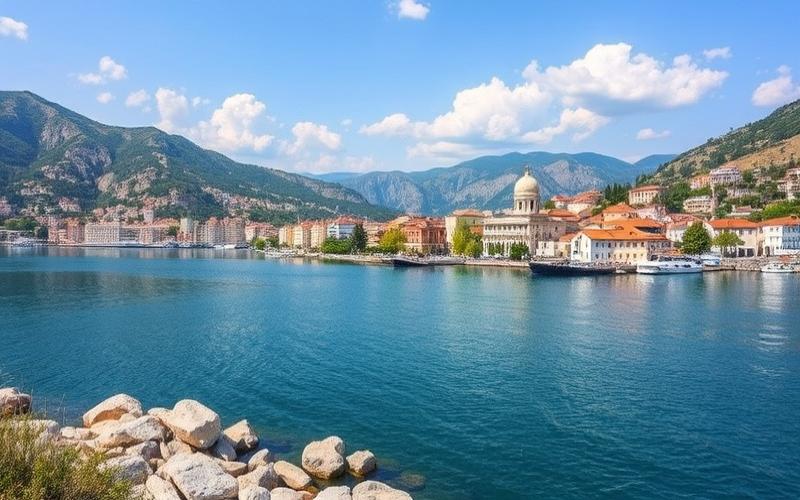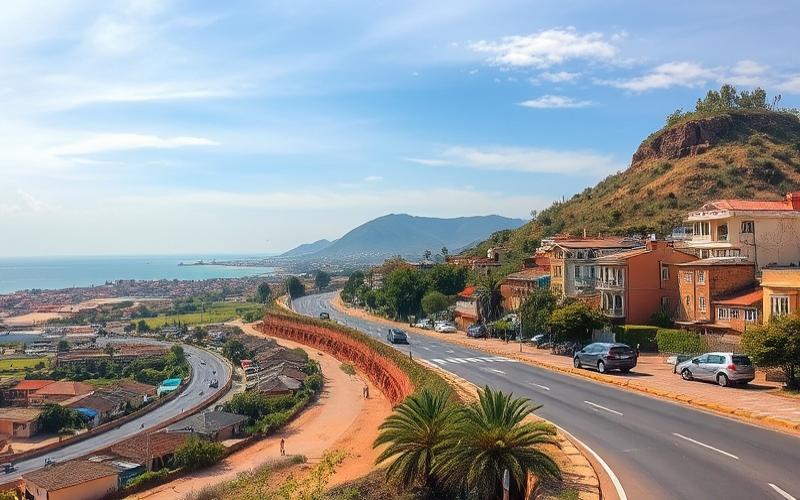
 Published on and written by Cyril Jarnias
Published on and written by Cyril Jarnias
Understanding Real Estate Laws and Regulations in North Macedonia
In a context where real estate is attracting more and more foreign and local investors, understanding real estate laws and regulations in North Macedonia becomes essential to avoid potential legal pitfalls.
With an expanding market, this Balkan country offers interesting opportunities but requires thorough knowledge of current legislation to venture in confidently.
Between property rights, acquisition processes, and tax obligations, familiarizing yourself with these legal aspects is indispensable for every market player.
Whether you’re an experienced investor or a newcomer, this article will guide you through the main regulations to make your real estate project a success in North Macedonia.
Investing in North Macedonia: What Foreigners Need to Know
Foreigners can invest in real estate in North Macedonia, under certain legal conditions that vary depending on nationality and the type of property sought.
Legal and Regulatory Framework
- EU and OECD nationals generally benefit from facilitated access to property.
- For nationals of other countries, a reciprocity clause applies: they can only purchase if their country also allows Macedonian citizens to acquire property on its territory.
- Establishing a local company is an alternative to bypass certain restrictions, particularly for obtaining a residence permit.
| Property Type | Purchase Possible for Foreigners | Main Restrictions |
|---|---|---|
| Apartments | Yes | None |
| Commercial Premises | Yes | None |
| Agricultural Land | No/Partially | Heavily regulated/prohibited |
Purchase Process
- Signing the contract before a public notary
- Payment of property transfer fees to municipal authorities
- Registration with the real estate cadastre (official transfer)
- Payment of taxes: property sales tax, potential VAT, registration fees, annual property tax
All contracts must be notarized.
Specific Legal Requirements
To obtain a temporary residence permit, it is generally necessary to invest at least 40,000 euros in residential real estate.
This threshold also extends this right to immediate family if the applicant is from the EU or OECD. Other nationals must go through a local company to benefit from the same advantage.
Tax Benefits and Incentives
The Macedonian tax framework is attractive: relatively low rates on real estate capital gains and absence or moderation of inheritance taxes depending on the context.
Some municipalities occasionally offer tax relief or administrative facilities to attract international investors.
Dynamic Real Estate Sectors & Regional Variations
Urban markets like Skopje, a dynamic capital with strong rental demand (particularly student housing), represent the most active sector. Tourist cities around Lake Ohrid are also seeing growing interest.
Regionally:
- Few major variations in legislation; however, some rural areas locally apply more restrictions on agricultural land.
Current Market Trends
- Gradual but moderate price increases in major cities
- Strong seasonal rental attractiveness near Lake Ohrid
- Increased interest in commercial investment linked to regional economic development
Residence Permits & General Framework
A significant real estate investment can facilitate obtaining a temporary permit. The economic climate remains stable thanks to prudent monetary policy, contained inflation, and a pro-business environment aimed at attracting foreign capital.
- Limited rights on agricultural land
- Strict notarization requirement
- Favorable taxation compared to Western European standards
Current macroeconomic stability thus encourages both residential and commercial investments while guaranteeing legal security for foreign buyers.
Good to Know:
Investing in North Macedonia presents interesting opportunities for foreigners, although some restrictions apply, particularly the inability to directly purchase agricultural land. Foreigners generally need to establish a local legal entity to acquire certain types of real estate. Purchase procedures include specific legal steps such as obtaining a tax identification number before signing any contract. The Macedonian government offers attractive tax incentives, like tax reductions for purchasing properties in certain priority development zones. The most dynamic real estate sectors include residential properties in Skopje and commercial opportunities in Ohrid. Legislative variations may occur across different regions, influencing both prices and purchase processes. Current market trends indicate increasing demand for apartments and commercial premises, driven by growing economic stability and business-friendly reforms. Finally, owning property can facilitate obtaining a residence permit, thereby expanding investment prospects for foreigners.
Understanding Essential Real Estate Laws
Understanding essential real estate laws in North Macedonia is crucial for securing and optimizing any investment, whether purchase, sale, or rental. Real estate regulations govern not only land ownership and taxation but also environmental obligations, ensuring a transparent and secure market for both local and foreign investors.
Why Are These Regulations Important?
- They protect the rights of owners and tenants.
- They guarantee the legality of transactions.
- They enhance market attractiveness for international investors through increased transparency.
| Domain | Key Regulation | Practical Impact |
|---|---|---|
| Land Ownership | Law on Property and Other Real Rights | Strict verification of property history by the cadastre |
| Taxation | Taxation on purchases/sales; prohibition on using certain retirement funds (EIP) | Mandatory declaration for each transaction |
| Rental | Mandatory written contracts with compliance to energy standards | Enhanced protection for landlords/tenants |
| Eco-Construction | Strengthened energy standards (Energy Law 2025) | Initial additional cost but future property appreciation |
Main Laws to Know:
- Land Ownership Law: Every transaction must be registered with the Real Estate Cadastre Agency. Preliminary review includes complete legal verification (titles, potential encumbrances), verification of permitted uses (zoning).
- Real Estate Taxation: Each purchase or sale involves a specific tax declaration. Some sources mention that the government now prohibits using certain financial products as direct sources for real estate investment.
- Rental Regulation: Contracts must be formalized in writing; they now sometimes include an energy component in compliance with growing environmental standards.
- Mandatory Environmental Standards from 2025: Every new building must meet strict energy performance inspired by European standards. Eco-certifications like BREEAM or LEED are encouraged.
Legal procedure during a typical real estate transaction:
- Due diligence conducted by a local legal professional.
- Official verification via the national cadastre AREC.
- Mandatory signing before a notary – who guarantees compliance and legal security.
- Official registration with competent authorities (cadastre/taxation).
Concrete Examples:
A foreign investor wishing to acquire an apartment must check if their country benefits from reciprocity conditions with North Macedonia: only EU/OECD nationals have direct access to certain categories of residential/commercial properties; otherwise, they must go through a dedicated local structure.
A developer launching new construction must anticipate strict application of new energy requirements starting January 2025, under penalty of administrative refusal or increased financial penalties.
Good to Know:
Real estate regulations in North Macedonia are of crucial importance for investors and owners, as they govern purchase, sale, and rental transactions. The Land Ownership Law ensures security of property rights, while real estate taxation imposes taxes on transactions and property ownership. Real estate transactions require the involvement of a notary to ensure compliance with legal standards, and rental contracts must adhere to strict conditions to protect tenants and landlords. For example, when purchasing a property, a notary will verify property titles to avoid disputes. It is crucial to understand and comply with these laws to succeed in the local real estate market, as they provide not only legal assurance but also essential economic stability.
⚠️ Understanding and respecting these laws is not optional: any negligence can lead to administrative blockage, tax penalties, or even outright cancellation of a real estate transaction in North Macedonia!
Mastering this legal framework allows both investors and local owners not only to avoid any disputes but also to enhance their assets in an attractive market that is moving towards greater sustainability and regulatory transparency each year.
Local Taxation: What Property Owners Should Anticipate
Property Tax in North Macedonia:
- The property tax is the main local tax imposed on real estate owners.
- The tax rate generally varies between 0.10% and 0.20% of the cadastral value of the property.
- The cadastral value serves as the calculation base: it is determined by local authorities based on criteria such as location, type, size, and use of the property.
| Property Type | Typical Tax Rate |
|---|---|
| Residential | 0.10% to 0.20% |
| Commercial/Industrial | May be slightly higher or variable by municipality |
Other Local Real Estate Taxes:
- Some municipalities apply additional taxes for local services (household waste, roads).
- Specific rates can vary by municipality.
Variation by Location and Property Type:
- Major cities or attractive areas may apply rates close to the ceiling.
- In rural or less developed areas, the rate tends towards the lower end of the indicated scale.
“Local taxes: they vary by municipality but generally remain moderate. The main one is the property tax.”
“Tax rate: It generally varies between 0.10% and 0.20% of the property’s cadastral value.”
Recent Legislation and Tax Developments:
- No major recent tax upheavals reported regarding property tax on residential real estate.
- The tax system remains stable to attract foreign investors and expatriates with relatively low tax pressure on residential real estate.
Deadlines & Payment:
Deadlines are set by each municipality; they generally occur once a year.
- Annual receipt of a local tax notice
- Direct payment to municipal tax services
- Possibility sometimes offered to pay in installments
Recourse in Case of Dispute:
If you believe your cadastral assessment is incorrect or the claimed amount is excessive:
- Request a review from the competent local service
- Provide supporting documents (comparative evidence)
- In case of persistent refusal: appeal to the local administrative court
Tips for Preparing These Tax Obligations:
- Strongly advise owners to:
- Update their cadastral file immediately after any modification to the property (extension/renovation)
- Set aside an amount equivalent to the estimated maximum each year (i.e., up to 0.2% to avoid any bad surprises)
- Anticipate any legislative changes through regular consultation of official municipal websites
Regional Comparison:
| Country | Average Property Tax Rate | Observations |
|---|---|---|
| North Macedonia | 0.10–0.20% | Among the lowest |
| Bulgaria | ~0.15–2% | Strong local variation |
| Serbia | ~0.40–2% | Often higher |
| Greece | Progressive up to approx. ~1% | Complex system |
Real estate tax pressure thus remains moderate or even low in North Macedonia compared to its immediate neighbors in the Balkans.
Good to Know:
Property owners in North Macedonia should be attentive to the property tax, whose rate generally varies between 0.10% and 0.20% of the property value, based on location and type of property. It is crucial to verify the taxable value with local authorities, as recent adjustments may affect the tax burden. In addition to the property tax, owners may be subject to transfer duties when selling property. Local tax regulations are constantly evolving; it is therefore important to follow recent legislation, particularly those that might introduce exemptions or rate increases. Payment deadlines are generally set for March 31 each year, and it is possible to contest the assessment in case of disagreement. Planning a financial reserve anticipating possible fluctuations is recommended, while comparing with neighboring economies, such as Serbia or Bulgaria, to better understand regional tax practices.
Property Owners in Macedonia: Your Rights and Recent Changes
The fundamental rights of property owners in North Macedonia are primarily guaranteed by the Constitution. According to Article 30, the right to property and inheritance is explicitly protected. Property creates rights and obligations, serving both the individual and the community. No one can be deprived of or limited in their property rights, except for the public interest and according to procedures provided by law. Any expropriation must result in fair compensation of a value at least equal to market value.
Article 30: “The right to property and the right to inheritance are guaranteed… No one may be deprived of or limited in their property… except for the public interest… In the case of alienation… fair compensation which cannot be lower than market value, is guaranteed.”
Article 26 also guarantees the inviolability of the home: any interference is permitted only based on a reasoned judicial decision (particularly in case of crime prevention or investigation).
For foreign investors, Article 31 specifies that they can access property rights in accordance with conditions defined by specific legislation.
Summary Table of Main Constitutional Rights Related to Property
| Fundamental Right | Constitutional Protection | Possible Limitations |
|---|---|---|
| Property | Article 30 | Public interest, compensation |
| Inheritance | Article 30 | Specific law |
| Inviolability of Home | Article 26 | Judicial decision |
| Access for Foreigners | Article 31 | Legal conditions |
Recent Legislative Reforms
Recent reforms have concerned access to justice, notably with a new law easing conditions for obtaining free legal aid (LFLA). This reform particularly targets disputes related to housing and real estate property:
- Extension of criteria to benefit from free legal assistance.
- Broader coverage of administrative, judicial, and expert fees.
- Inclusion of independent organizations in monitoring these mechanisms.
This evolution significantly improves the ability of property owners (both local and foreign) to defend their rights in court, even without significant financial means.
Furthermore, several initiatives target better legal information for marginalized or vulnerable groups through:
- Creation of justice access centers,
- Deployment of trained paralegals,
- Institutional strengthening against any housing-related discrimination.
Practical Implications
For local residents
- Better effective access to legal defense in case of real estate disputes.
- Potential decrease in risks related to procedural ignorance during expropriations or land limitations.
For foreign investors
- Increased security thanks to a transparent framework on respect for property rights.
- Enhanced possibility of obtaining rapid redress in case of administrative disputes with minimal constitutional guarantees on compensation amount.
Recommended Actions to Comply with New Regulations
- Regularly verify land titles with the competent public registry.
- Consult a specialized local lawyer for any major real estate project (acquisition/sale/investment).
- Utilize if needed recent public mechanisms allowing free legal aid in disputes related to one’s real estate property.
- Stay informed through recognized associations about any future modifications concerning foreign access to land (evolving law).
Defense Opportunities Facing Changes
- Fully utilize all avenues offered by LFLA to contest expropriations deemed abusive or insufficient compensation.
- Quickly resort to free services offered in certain specialized municipal centers upon suspicion of unjustified infringement on one’s property.
- Rely on associative networks working specifically against legal discriminations to ensure one’s case is treated fairly even if belonging to a national/ethnic/social minority.
The Macedonian legal framework firmly guarantees both material and procedural respect for property rights; it is now enriched each year through various laws that genuinely facilitate its practical defense before all competent authorities—local and national—benefiting both the citizen and any prudent international investor seeking increased contractual security and administrative transparency in this emerging European country!
Good to Know:
Property owners in North Macedonia enjoy fundamental rights protected by laws such as the Law on Property and Other Real Rights, which guarantees tenure security and the right to autonomous management of assets. Recent legislative reforms, notably the amendment to the Law on Land and Property Allocation, aim to simplify land registration procedures, positively impacting the real estate market by reducing bureaucracy and increasing transparency. These changes favor foreign investor interest while ensuring better protection for local residents. To comply with new regulations, property owners are advised to update their cadastral documents and consult legal specialists to ensure proper adherence to new norms. Property owners can assert their rights by participating in local associations that defend real estate interests in the face of these legislative developments.
Disclaimer: The information provided on this website is for informational purposes only and does not constitute financial, legal, or professional advice. We encourage you to consult qualified experts before making any investment, real estate, or expatriation decisions. Although we strive to maintain up-to-date and accurate information, we do not guarantee the completeness, accuracy, or timeliness of the proposed content. As investment and expatriation involve risks, we disclaim any liability for potential losses or damages arising from the use of this site. Your use of this site confirms your acceptance of these terms and your understanding of the associated risks.






